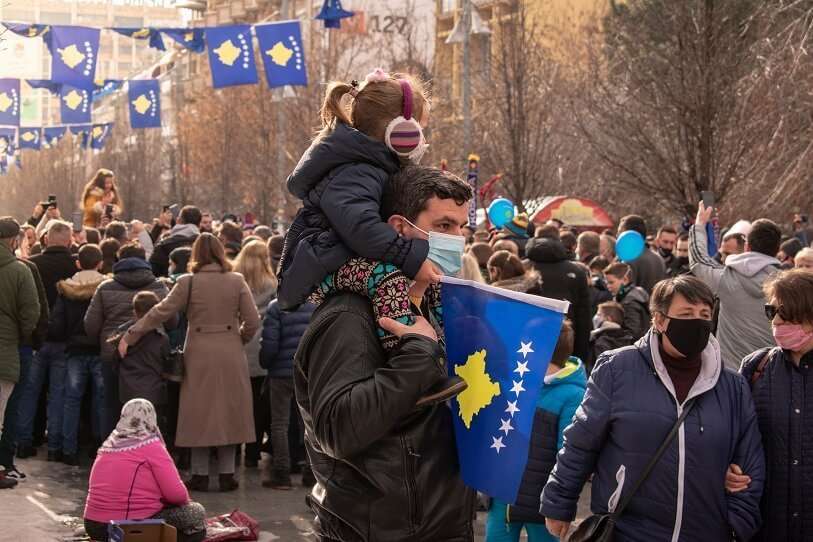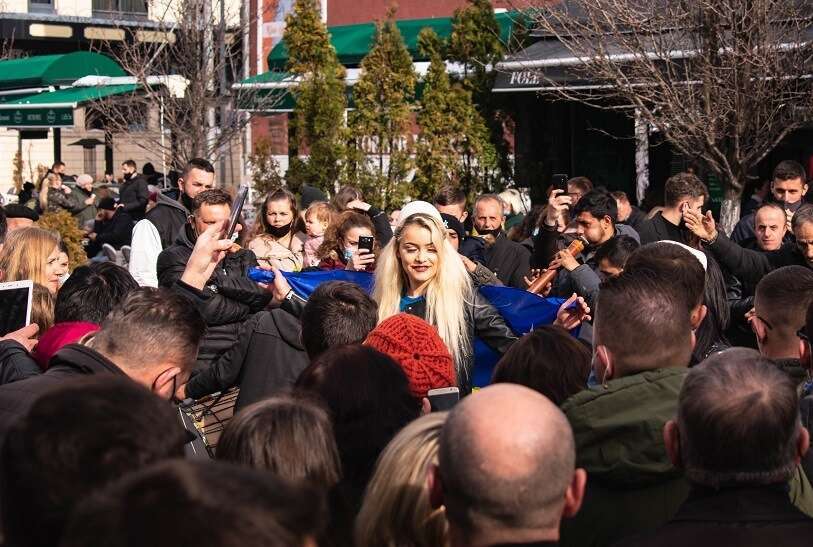Kosovo turns its back on Vetëvendosje

On Sunday 17 October municipal elections were held in Kosovo. This was the second time this year that Kosovars went to the polls after the presidential elections in February. Thirty-eight municipalities voted for their representatives for the next four years. In most cases, with the exception of the Serb-majority municipalities in the north of the country where victory was known to be in the hands of the Serbian List (Српска листа, in Serbian), the decision at the polls was to be between the ruling Lëvizja Vetëvendosje (LVV), the Democratic League of Kosovo (LDK) and the Democratic Party of Kosovo (PDK).
The Democratic League of Kosovo (LDK) and the Democratic Party of Kosovo (PDK) are the parties that have governed the country since independence and until this year. Both parties, with a right-wing ideology and openly pro-European, focused their governments on Kosovo's integration into the international community and negotiations with Serbia.

The LDK is the oldest party in the country, founded in 1989 by Ibrahim Rugova, the father of Kosovo's independence. The PDK is the political branch of the Kosovo Liberation Army (KLA) and has been in power since the 2010 elections that gave the presidency of the parliament to its then leader, Hashim Thaçi, until February 2021.
Corruption scandals, lack of initiative and the neutral stance of both formations led Kosovars to see Vetëvendosje as the only solution to the country's problems and gave it victory in the parliamentary elections in February this year. Vetëvendosje (self-determination) is an Albanian nationalist formation founded in 2005, headed by Albin Kurti, and is the only left-wing alternative in Kosovo.
Just under 800,000 voters went to the polls this Sunday out of a total of 1,885,448 registered voters, i.e. the turnout rate in the country was 42.7%. A figure that is the lowest compared to previous years where the lowest turnout was in the 2017 municipal elections when it was 44.1%.
These elections were held against a backdrop of tensions between the Albanian and Serb populations in the northern parts of the country. The number plate crisis and investigations into numerous smuggling cases have created a state of constant violence in Kosovo Serb municipalities. However, despite this, or precisely because of it, these municipalities have registered the highest turnout in the country, giving victory to the Serbian List. The formation that directly follows Belgrade's orders has won nine of the ten Serb-majority municipalities.

In a situation where Serbs find themselves in a no-man's land and, in recent weeks, have been "harassed" due to the "unilateral actions" of the Pristina government. They refer to the police raids against smuggling in these areas, which they themselves consider "an attack on the Serb population in Kosovo". They see the Serb formation as their only alternative to the decisions of Albin Kurti's party.
The results in the rest of the country's municipalities, all with Albanian majorities, have turned the situation in February upside down. Where earlier this year, Vetëvendosje led, in historic fashion, in results across the country, eight months later, the party that controls parliament has failed to win any of Kosovo's 38 municipalities.
When Sunday's election count came to an end, the prime minister's party had not won a single municipality in this first round, so it will have to wait for a run-off in four of the seven major municipalities: Pristina, Prizren, Gjakove and Gjilan. In total, 22 of the 38 municipalities will hold a second round of voting for mayors.
For its part, the Democratic Party of Kosovo (PDK), in power until the entry of Vetëvendosje, has won South Mitrovica, Ferizaj and Skenderaj. The party had also won the municipality of Hani i Elezit, but the result was annulled on 25 October for electoral fraud, so it will also have to go to a second round of elections. Meanwhile, the Democratic League of Kosovo (LDK) has won in Peje and Lipjan and will contest a run-off in some other municipalities.
These elections have also shown how male-dominated political competition is in Kosovo. Although candidates have made constant references to women's empowerment during their campaigns, the number of women in their ranks shows that these words are little more than empty rhetoric.
In these elections, only nine women were candidates on the lists of the main parties; four on the PDK lists, three on the LDK lists, and two on the LVV lists. Out of a total of 165 mayoral candidates in the 38 municipalities, only 13 were women.
It is not only the political parties that demonstrate the lack of gender equality in the country, but the voting patterns of the citizens have also shown in these elections that elections are still in the hands of men. 18.86% was the highest support a female candidate received in these elections, obtained by Hyri Dobrunaj of the KDP in Deçan, which is the highest a woman has ever obtained in the history of Kosovo after Kusari-Lila, the only female mayor in the country's history who governed Gjakova between 2014 and 2017.
LDK returns to the race for the capital city
In Pristina, the polls gave victory to the ruling party's candidate, in a scenario where the result was not determined by the electoral programmes, since the differences between them were insignificant, but by the closeness and acceptance of the candidates on a personal level. In this sense, the Vetëvendosje candidate, Arben Vitia, a former health minister until his candidacy for mayor, obtained the most support, but not enough to govern. The novelty in this result is that this support lost to the left-wing party, which went to the Democratic League of Kosovo (LDK) and its candidate Përparim Rama.
Pristina's voters are the country's young majority and the ruling party's largest voting niche, and its candidate had a good reputation and a good rapport with the people. In contrast, the LDK is a reflection of unfulfilled promises after the war, and in February young people's weariness of the formation that governed the first years of independence was evident. Moreover, its candidate, an award-winning architect who had been based in the UK for years, did not inspire empathy among voters.
However, campaigning seems to have paid off for the Democratic League. Rama has been able to identify promises that can appeal to Pristina's residents: renovation of the city's infrastructure, more green spaces and the creation of leisure facilities seem to have been the architect's 'easy' answer to the capital's problems. These promises have won the battle against Vitia's fight for greater access to healthcare and public education. Moreover, the Vetëvendosje candidate's strategy of 'hiding' at campaign time, unlike his opponents, has affected the results.
Few people doubt Vitia's victory in the second round. However, the results in Pristina have made it clear that the former ruling party has learned from its mistakes. Kosovo's oldest party realises that it must clean up its image if it wants to stay in the limelight; it has replaced the 'old faces' who are seen as responsible for the party's downfall with new faces that give a fresh image. And it seems to have worked. "Today, citizens showed their great dissatisfaction with the work of Albin Kurti's government in the first eight months of its existence. For us, a new beginning is starting, uniting with the citizens to stop the degradation of the ruling values in Kosovo," declared PDK head Memli Krasniqi in the wake of the election results.
The situation in the capital has little to do with the rest of the country's municipalities. The results at the beginning of the year, where the map was red with the victory of Vetëvendosje in almost every city, were logical. A recipe that combined the unfulfilled promises of the LDK and PDK, Vetëvendosje as the only real left-wing alternative that focused on the country's problems rather than on false Europeanist illusions that nobody believed anymore, and the new young voters who wanted drastic change and new alternatives, gave the self-determination party all the ingredients to win.
Vetëvendosje satisfied older generations fed up with the neutrality of the other two formations by being the only party that broke with Serbia. In addition to the historical strength that the pro-Albanian formation has always had and the symbolic weight that Albin Kurti has had for the country since his participation in and condemnation of the 1996 university demonstrations against the Yugoslav occupation. The LVV used its history and activism, along with a programme that focused on fighting corruption and nepotism. corruption and nepotism left by previous formations in the institutions, and that promised job opportunities for young people, to win the February presidential elections.
However, this strategy that took him to the top at the beginning of the year has not worked in the municipal elections. This image of an alternative party with young faces may win in Pristina or Prizren, where most of the country's young voters are concentrated, but it should not be forgotten that most of the country is rural and the population in these areas has seen these new faces on their respective lists as "inexperienced puppies". This was the case in Gjilan, for example, where Alban Hyseni, the LVV candidate, failed to win a sufficient majority to govern despite proving to be one of the best candidates in all of Kosovo during the election campaign. Hyseni goes to a run-off against the Democratic League candidate, Lutfi Haziri, who is one of those 'old faces' of the League who has little sympathy among young people, but who has been able to use his experience and closeness to his 'lifelong' neighbours as a trump card.
The dissatisfaction of a large part of Vetëvendosje voters at the beginning of the year due to the lack of promised drastic action, coupled with the lack of experience and know-how that the formation has shown on more than one occasion, and the renewal of the League and the Democratic Party, have returned Kosovo to the results typical of its young history before 2020. Moreover, it should not be forgotten that in Kosovo people vote for the person and not the party, and Albin Kurti cannot be on every list. Even if the Prime Minister shows his support for these young candidates, voters in Gjilan, Ferizaj, Peje and the rest of the 38 municipalities have voted for 'experienced' candidates.
We will have to wait for the run-off scheduled for November to see what colour the Kosovo map will be. It is certain that Vetëvendosje will win Pristina and most of the municipalities it is still playing for. As MP Fitore Pacolli sees it, "we will win everywhere we are in the second round. Compared to the last municipal elections in 2017, when our party came third, we are now the most voted". However, the municipalities have shown Kurti's formation that February's results were an anomaly, and that his party must begin to live up to the expectations of its young voters if it wants to stay on the map, because the party and the Democratic League have made it clear to Vetëvendosje in these elections that the other half of the country is historically theirs.








